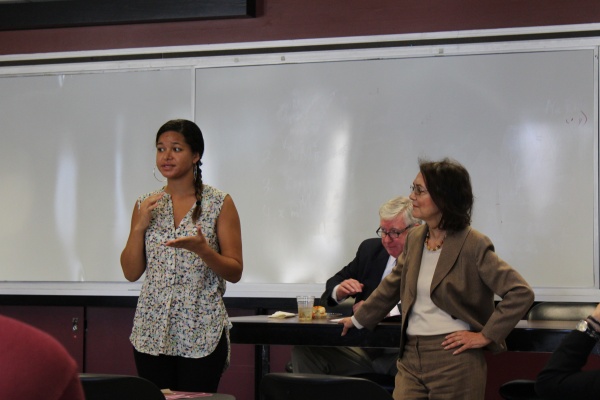College Council Discusses Failure to Respond to ‘Bias Incidents’
Pictured from right to left, Dr. Clara Rodriguez and Zann Ballsun-Simms addressed the council’s concerns on talking about the bias incidents. (CONNOR MANNION/THE OBSERVER)
October 22, 2015
The College Council on Oct.15 took a different tone than usual, dedicating the entire meeting to discussing ways to have professors and academic departments respond to the ‘bias crimes’ at Rose Hill. According to Robert Grimes, dean of Fordham College at Lincoln Center (FCLC), “Many professors had voiced their concerns about being able to respond properly after Father McShane’s’ email asking professors to discuss this in class … students have also noted that they felt that many professors were not responsive.”
The usual business of the College Council was quickly moved through so that the rest of the meeting could give way to an open forum on how professors might respond to the bias incidents, and how they felt they should move forward in discussing these incidents with students. To help facilitate the conversation, Clara Rodriguez, professor of sociology, was asked to speak in front of the forum held in LL 816. “I do teach on race, and discuss this on a daily basis in class, but I had a lot of faculty ask me about how to discuss this subject.”
Also invited to the council were members of the Dorothy Day Center for Service and Justice (CSJ), Ijeoma Nwaogu, assistant director of the Office of Multicultural Affairs (OMA), and Zann Ballsun-Simms, FCLC ‘16 and president of BSA. “There’s a larger concern about the language that students are using, so we’d like help in addressing that from professors,” Ballsun-Simms added.
Faculty, when prompted to talk about race by the email sent by Father McShane, felt completely unprepared to talk. According to Sarah Zimmerman, professor and associate chair of the English department, “Some of the teachers feel like we need scripts or defined ground rules for conversations, we need practical advice to do this.”
“So much of what people say about race is distorted and unhelpful, because it is not a part of our daily conversation, it is only discussed after some tragedy.”
Nwaogu answered Zimmerman’s question: “You have to really start from just a place of care, and it will always be uncomfortable having these conversations. I’ve been doing this and studying these subjects my entire life and I’m still uncomfortable with many of these conversations.”
“But that is what it means to be a facilitator–it comes from the Latin ‘to make easy,’ so we can put people at ease so we can learn from each other, not just force a discussion,” she continued.
Rodriguez noted that the main concern she had heard from the faculty was that they were afraid of offending students, but that it wasn’t productive to avoid this if it meant avoiding conversation entirely.
“A colleague of mine once said that ‘we are all racists and we live in a racist society, we build everything off what we assume of others.’ So we have to get past this fear of offending,” Rodriguez said.
Amir Idris, professor and chair of the African and African American Studies department, made a similar point. “So much of what people say about race is distorted and unhelpful, because it is not a part of our daily conversation, it is only discussed after some tragedy. In Canada, talking about race is a part of multiculturalism, and it is a daily conversation,” he said. “If you do not create a space for people to speak freely, they will not talk about it.”
Gwenyth Jackaway, associate chair of communication and media studies, noted that while race was an issue, “We’re very comfortable speaking about gender, and there are multiple classes on the schedule that concern that. So thinking about scheduling, we can create classes in the curriculum to create space to talk about these issues.” Many of the faculty agreed with this, and Nwaogu also mentioned an upcoming workshop for faculty that would work as training for facilitating dialogue on race relations. According to her, “we’re establishing a focus group to plan what students would like to see in these workshops.”
“It’s not as scary as it seems to talk about this … for the most part college students are very mature and do handle these discussions well,” she continued. Rodriguez also clarified that it is not a binary issue in discussing race, and many issues are also worth constant discussion. “It’s not just white and black and it’s not just race, it’s class, gender, sexual orientation … that reinforces the tendency to look at this as having only two sides.”
The meeting ended with Grimes asking the council to remember what was said at the meeting. “It’s extremely important that you bring back what was said here back to your respective departments,” he said.












